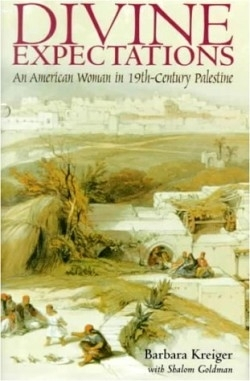Divine Expectations
An American Woman in Nineteenth-Century Palestine
After waiting on a hilltop along the Schuylkill River near Philadelphia for several days for Christ’s return, Clorinda Minor and other followers of William Miller, a Baptist preacher, had fallen asleep after the hour had come and gone. A terrible storm shook their encampment and sent the frightened, disillusioned people running for safety.
Unlike the others, Minor vowed to devote her life to creating the conditions for Christ’s return, chief among them the establishment of the Jewish people in the land of Israel. “In the short time she had in Palestine, Clorinda S. Minor accomplished her goal—helping in the process of awakening Jews to their land, and thus to themselves. Without making larger claims than her work can bear, one can say that though she believed devotedly in the future, she lived passionately in the present.”
Kreiger (Dartmouth College) has woven together the small amount of historical data available from the period of time during which Minor lived, and the entries from her diaries, to show the extent to which she believed she was fulfilling what God expected—indeed, demanded of her. She could do nothing less than leave everything she had in America (including her husband) for such a task.
Minor had as her goal the training of the Jewish people to develop and farm their own land, raising crops and selling them to become self-sustaining and prosperous. Her methods were the precursor to the modern kibbutz. She believed that in living and working in this way the Jews would cause the land to flower and become ready for their occupation of it as a nation, in fulfillment of the Scripture in Ezekiel 37:14 where God says “And I will put My Spirit within you, and you will come to life, and I will place you on your own land”; and also Jeremiah 23:3, “Then I Myself shall gather the remnant of My flock out of all the countries where I have driven them and shall bring them back to their pasture; and they will be fruitful and multiply …. Judah will be saved, and Israel will dwell securely.” The prophecies of the Old Testament are integral to the understanding of Minor’s zeal.
Minor was not actively converting Jews to Christianity, but as they caught the excitement of her vision, and as they experienced the care and concern she had for them as a people, they liked what they saw and many converted to Christianity. This, or course, led to persecution of the Jewish Christians by their Jewish neighbors. This interlinking of politics, religion, passion, suffering, racism and world events that were taking place at the same time is what makes Divine Expectations so captivating.
The authors have chosen journal writings that give a taste and feel for all the hopes, sufferings, anxieties and accomplishments of this woman. For example, upon seeing the persecutions and trials of the Jews of Jerusalem and Jaffa, Minor, who longed for her Christian Presbyterian friends to be more involved in supplying much needed clothing, wrote, “Oh that God would arouse his people to feel for this long degraded, oppressed race, whose debtors they are.” Concerning the Jews who wanted to work on her farms she wrote that she “longingly wished for enough rooms to house them, having no doubt that many were ready to come.”
All Minor achieved, the drive to succeed at what she believed to be her God-given duty, the confronting of governments and cultures of which she had very little understanding and which had the power to crush her—all of these things would be highly noteworthy in this twentieth century women’s liberation culture. The amazing fact is that she did all of this in a nineteenth century closed, rigid setting. As Kreiger and Goldman (Emory University) take the life of an ordinary American woman and trace the extraordinary path she took, the reader is given the opportunity to go inside Minor’s thoughts and passions and enter into the fervor of her mission. This is experienced, for example, when reading Minor’s explanation of herself as being a type of Esther from the Old Testament Scriptures, who had been summoned by “God to go to Mount Zion and make ready the land of Israel for the King’s return.”
Her vision was beyond most of her contemporaries to fathom, but her work was daily work, physical and social. In this way her imprint remained for a long time in the new Jewish consciousness that was emerging and which would lead to political Zionism, the influx of Jews to Palestine and the establishment of the State of Israel.
No one who is serious about knowing women’s history should be without this book. It is a compilation of the crazy, the unfathomable, the compassionate, the sensible and the courageous.
Reviewed by
Linda Wilson
Disclosure: This article is not an endorsement, but a review. The publisher of this book provided free copies of the book to have their book reviewed by a professional reviewer. No fee was paid by the publisher for this review. Foreword Reviews only recommends books that we love. Foreword Magazine, Inc. is disclosing this in accordance with the Federal Trade Commission’s 16 CFR, Part 255.

